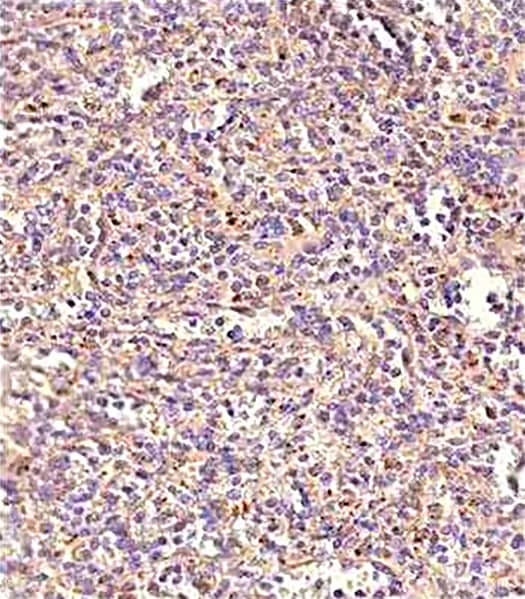The CD (Cluster of Differentiation) nomenclature was established in 1982 at the First International Workshop on Human Leukocyte Differentiation Antigens. It was intended for the classification of leukocytes according to the specific epitopes found at the cell surface, and at this inaugural meeting 139 monoclonal antibodies were evaluated. These antibodies had been used by various researchers to perform immunofluorescent cell staining, and were grouped into clusters based on similar reactivity to specific cell types (1). Eleven clusters were designated at this meeting, however to date more than 350 CD molecules are currently known, and this number continues to grow.
Antibodies grouped together at the Third International Workshop on Human Leukocyte Differentiation Antigens included the clones Y2/131, EBM11, Ki-M6 and Ki-M7, all of which were found to immunoprecipitate a protein of 110kDa from tissue sections. Another antibody, KP1 (NB100-683), which had previously been shown to identify macrophages in paraffin-embedded tissue, was also found to recognize this protein. Furthermore a sixth antibody, Y1/82A, was shown to bind to the same protein following transfection of murine cells with cDNA encoding it; clones Y2/131, EBM11, KP1 and Ki-M6 were also tested in this way, although KP1 did not recognize the protein in this instance, possibly due to differences in glycosylation by the transfected cell line compared with human tissue. This group of antibodies was designated CD68 at the Fourth International Workshop on Human Leukocyte Differentiation Antigens in 1989 (2).

Immunohistochemistry-Paraffin: CD68/SR-D1Antibody (KP1) - Unpurified [NB100-683] - CD68/SR-D1 Antibody (KP1) [NB100-683] - Analysis of a FFPE human spleen tissue section using 1:10 dilution of CD68/SR-D1 antibody (clone KP1) with HRP-DAB based detection method and hematoxylin counterstaining. The antibody specifically labelled the macrophage cells in the tested section.
Broadly speaking there are four types of CD molecule. Type I transmembrane proteins have a cytoplasmic C-terminus and an extracellular N-terminus, type II transmembrane proteins have a cytoplasmic N-terminus and an extracellular C-terminus, type III transmembrane proteins cross the plasma membrane multiple times and may form transmembrane channels, whilst type IV glycosylphosphatidylinositol-anchored proteins are tethered to the lipid bilayer through a glycosylphosphatidylinositol anchor.
CD68, also known as Gp110 or macrosialin, is a type I transmembrane glycoprotein of 110kDa. Pulford et al used the six antibodies discussed previously to evaluate expression of this protein in human blood, tissue and cell lines, and demonstrated that all six antibodies stained macrophages and monocytes. Some of the antibodies also labelled neutrophils, basophils and/or lymphocytes, suggesting that the CD68 antigen may show some heterogeneity, possibly due to different levels of glycosylation (3).
In a more recent study, the CD68 antibody KP1 was used by Gollapudi et al as a marker of tumour-associated macrophages in prostatectomy samples from individuals with prostate cancer. This group labelled tissue microarrays with the CD68 antibody and found that the mean number of tumour-associated macrophages was higher in cancerous tissue as compared to benign tissue (4). In another study, Liu et al used CD68 antibodies to stain tissue biopsies taken from patients with Crohn’s Disease and from patients with Chronic Granulomatous Disease (CGD), a rare condition characterized by the inability of phagocytes to kill certain bacteria and fungi. They showed that CD68 expression could be used to distinguish CGD from Crohn’s Disease in patients with colonic inflammation when measured in conjunction with levels of other CD markers (5). CD68 is a valuable marker which can be used to identify macrophages and monocytes, and also has implications in the diagnosis of various disease conditions.
- PMID: 6334575
- PMID: 2803980
- PMID: 2078523
- PMID: 24224130
- PMID: 19229980
Bio-Techne offers various CD68 reagents for your research needs including:
Written by Emma Easthope